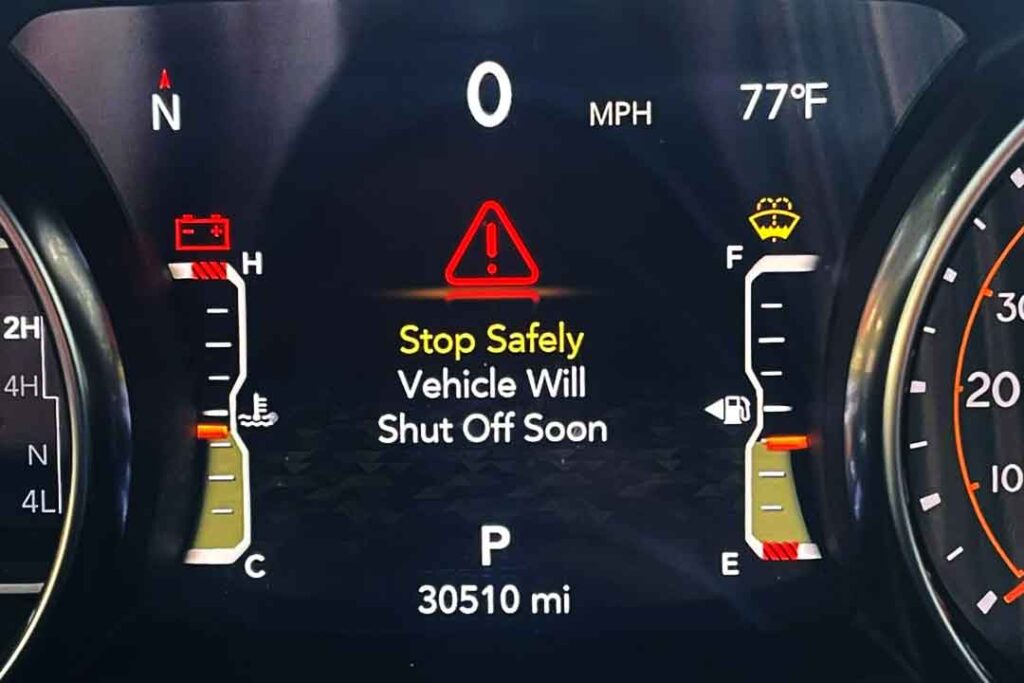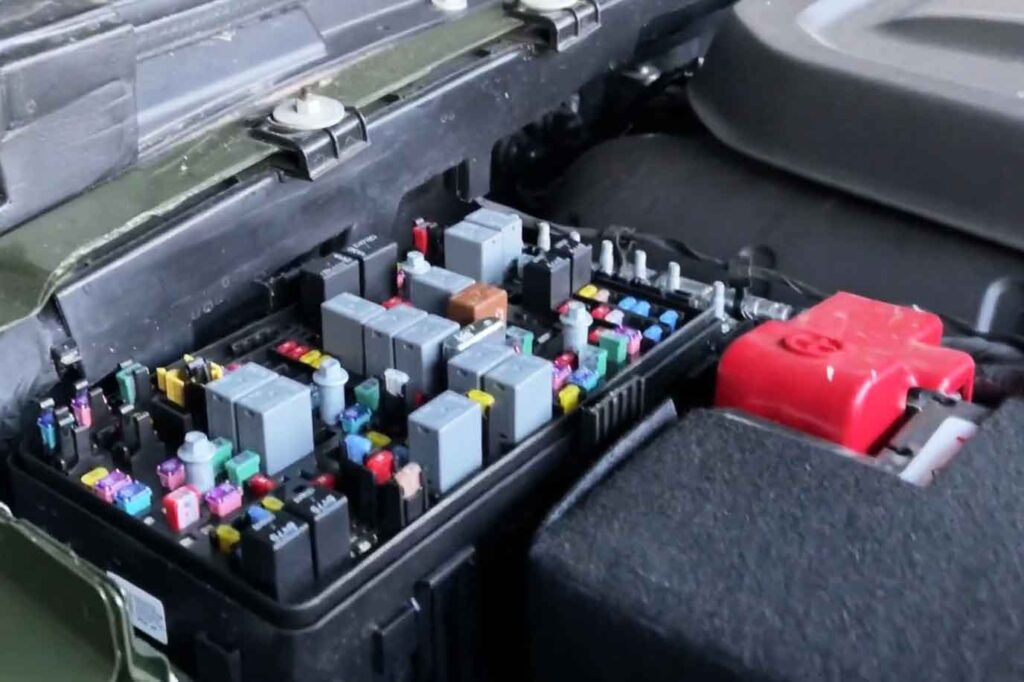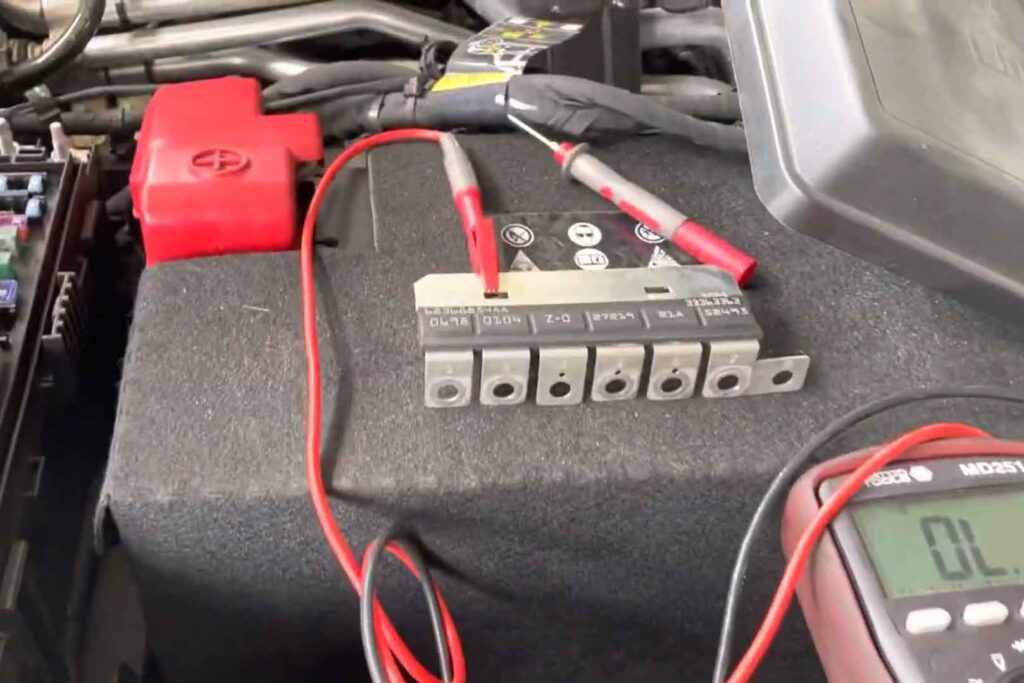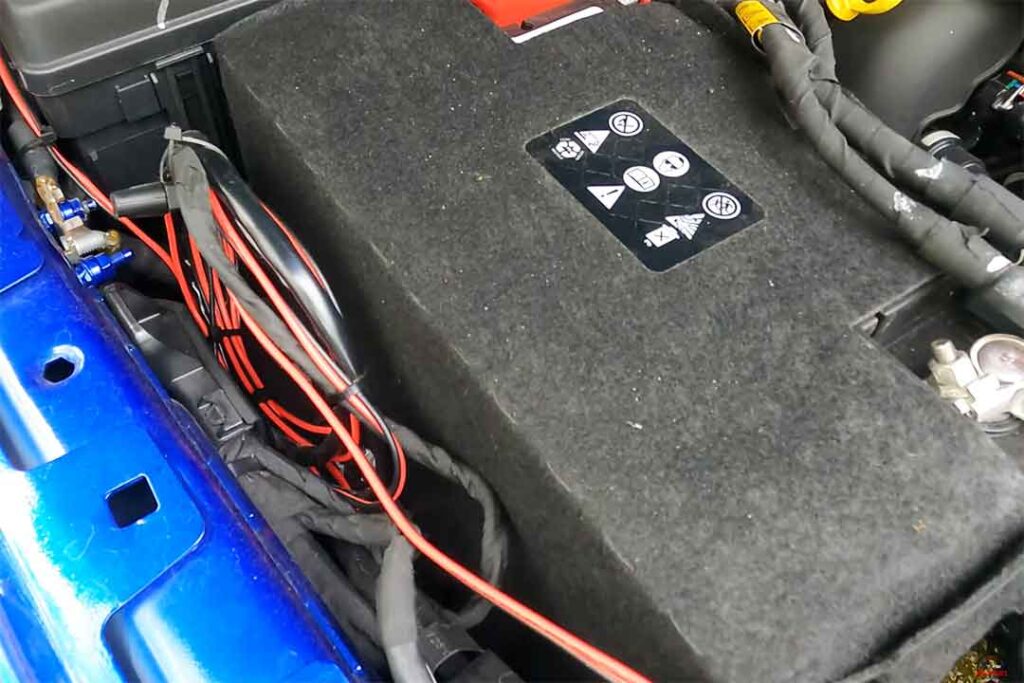Stop Safely Vehicle Will Shut Off Soon: What to Do? [Fixed]
Suppose, you are driving your Jeep on a city street. After flashing the warning “stop safely vehicle will shut off soon,” it turned off on its own. It’s scary and dangerous when a car is traveling down the road or through an intersection when it abruptly comes to a complete stop. It happens because of a faulty main or aux battery, a bad alternator, a blown fuse in the box, or a faulty ECM. Sometimes all it takes is a loose connection to cause the issue.
Many of you experienced the same problem. But you don’t have to worry anymore. Here I will discuss at length about this. Keep reading. It’s an important one!
Table of Contents
What Does the “Stop Safely Vehicle Will Shut Off Soon” Warning Mean?
When you turn on your car, it runs or idles normally for about a minute before saying, “Stop Safely, Vehicle Will Shut Off Soon.” And then, out of nowhere, your car begins to shake erratically and eventually dies on you.

If you turn off the ignition when this error appears, you may be able to restart numerous times without difficulty, but if you leave the car running, the car will eventually shut off.
After starting the car, the red battery light appears before the error message. Then a message is displayed informing the driver that the start/stop function is not currently available.
On occasion, turning on and off will only repeat the same problems. Even if you change both batteries, it might not work. Your screen may display various warnings for the battery, the check engine light, and a super low voltage reading of 10.3 volts.
If you turn the car off and back on again, the alarm will disappear. However, the warning will typically come back, and you won’t be able to clear it. Possibly, audio and transmission alarms will start to sound as well.
The transmission may make a clunk sound as you put it into drive if you try to restart it to get off the road.
You must thoroughly inspect your Jeep and identify the issue if you encounter these circumstances.
Reasons Behind “Stop Safely Vehicle Will Shut Off Soon” Warning & Possible Solutions:
Several things could cause “stop safely vehicle will shut off soon”. I couldn’t start my car anymore, so I kept driving that way for a few weeks before changing my aux battery. It disappeared and continued to function normally for a few days. However, I forgot to turn off the stop/start function one day, and when it died, I realized that my main battery was the problem.
A guy jumped me to restart the car. Unfortunately, the jump caused numerous issues by frying the fuse block underneath the positive battery jump post. I changed that fuse block. The initial main battery was still having problems. I put a new battery back in, and all issues were fixed.
The reasons for the warning are listed below:
1. Battery
Bad batteries (main and auxiliary) are the biggest reason for this issue. When the aux goes bad, it can drain the main battery quickly. A red battery icon is located above a yellow circled “A” on the dashboard.
Check your alternator output voltage on the dashboard to see if it is consistently 14.4 volts. If it isn’t, one of the two batteries is most likely dying. I’d pull both out to test them and take them to a parts store.
Sometimes when you install a new battery, you forget to tighten the power cables to the alternator. Sometimes they are simply hand-tightened. Your start/stop problem can result from this.
The two batteries should be the same voltage when the car is running because they should be connected directly to one another by a relay. The auxiliary battery, which powers many vehicle systems, will steadily discharge if the two batteries are improperly connected, preventing it from charging.
Your battery’s voltage ranges from 12.6 to 14.5 volts. It depends on the battery’s requirements for a charge; if you consistently see 14.4 volts, there might be a problem. Otherwise, it randomly jumps all over the place.
Check the ground wires and battery terminals for damage, tightness, and continuity if the voltage from your ESS battery is dropping steadily.
So what should you do if you suspect your battery is failing?
Have your main and backup batteries “Load Tested” if you’re sure you want to keep or use your current batteries and are willing to pay to have them checked out. Ensure the person performing the load testing displays the 2 printouts to you. One printout per battery. If one or both batteries need to be changed, the printouts will indicate that. If necessary, swap out the battery(s).
If you only need to replace one battery, it is best to replace both. For about $350-375+ total, you can purchase 2 aftermarket batteries, respectable AGM batteries. Buying two batteries will cost less than paying a technician an hourly rate to test and play with the old batteries.
Install Genesis Gen 3 dual battery kit with two Full throttle AGM batteries. Under the hood, it’s all on the same tray. In the future, when the auxiliary battery dies, there is no need to dig around under the fuse box.
2. Alternator
One of the leading causes of this problem is the alternator. If you suspect your battery isn’t charging. You should check your alternator. In most cases, an alternator won’t stop working, but its performance may deteriorate.
Both batteries are charged by the alternator. The PCM controls the charging voltage and rates based on the main battery’s condition (reported by the IBS), the throttle, the temperature, and a few other factors. Otherwise, the Aux battery powers all other devices, and the main battery is only used for starting. The Jeep switches to the main battery to power everything. If the ESS battery runs out or there is a problem, you get an ESS not available status.
If your vehicle’s stop-start system indicates that maintenance is required, check your alternator to see if the voltage regulator has worn out and, if so, replace the alternator.
3. Fuse Box
People who encounter this problem don’t immediately check the fuse box. But you definitely should.

Sometimes the fuse box’s main fuse needs to be replaced. The dual battery start-stop relay is sometimes to blame. It will clear all the error codes and read as if everything is in order each time the mechanic plugs in to get the error codes. Even though all of the dash’s lights and warnings are still on. If you drive with all the equipment and as soon as it pops on, you can pull over and capture it before it disappears again. It can also be an automatic shutdown relay.
In that case, purchase a new relay to resolve the issue.
Another thing is that one of the fuses can burn out. If so, replace it. We strongly advise making it a habit to turn off your Jeep’s auto stop before each and every trip.
When the aux battery failed during the testing of the main and aux batteries by the dealership, they decided to replace both. The new batteries did not make the issue go away. It was a relay located in a box next to the secondary battery.
Ensure the numbers on the electrical connectors in the fuse box are in the correct order.
The large fuse number 5, a component of the remote jump post assembly, guards the connection between the two batteries. You should also check that fuse.
Look especially at the high amp fuse array. Most people have a blown N3 fuse in the Fuse Array. The alternator can no longer charge the auxiliary (AUX) battery when N3 is blown. It can blow if the disconnected positive cables from the Main battery make contact with any nearby metal or N3 in the Fuse Array.

Therefore, if you change the batteries, check to see if all of the fuses in the Fuse Array are functioning correctly, or just replace the Fuse Array. Testing the fuse array with a basic multimeter takes about five minutes.
The cost of the Fuse Array is only $50. Therefore, replacing the array instead of paying a technician an hourly rate to test the fuse array is probably more economical.
Be careful. What part number of Fuse Array you use on your Jeep will depend on whether or not it has the Tow Package option.
An alternative solution for a blown N3 fuse is to move the wire from the N3 terminal to the N4 terminal.
4. Loose Connection
You should check for any loose grounds or corrosion.
I purchased brand-new batteries when it first happened to me. For a few weeks, there was no alarm. Then it started to come back. I checked the wiring and found that a wire was short. After that no alarms.

Therefore, check your car to see if any wires are loose before replacing everything, especially the side ground wire. Tighten it up to square away everything.
While this problem is present, you can tell because the auxiliary battery’s voltage gradually falls below 10 when you measure the voltage on both batteries. Look inside the hood at the positive jump terminal. Suppose the positive terminal is loose. In that case, the auxiliary battery won’t charge.
5. ECM
In case the clips are damaged, make sure to check the ECM plug connector from your ECM. If that’s the issue, try moving the ECM connectors. They need to be replaced. Your ECM plug problem will be resolved as soon as you do.
Other Things You Can Do
Remove the main and ESS batteries, and have the voltage/load checked at various auto parts and battery shops. If both batteries are good, test all under-hood fuses, and then test the large circuit breakers in the fuse panel.
If it’s not the battery or alternator, a malfunctioning PCM, corrosion in the connector, or occasionally the IBS will cause the “stop safely vehicle will shut off soon” message. Inconsistent live data from the IBS sensor or status data that was previously recorded there are frequently present.
If the problem is precisely the same for you. The power train control system may have received an update to address this reported problem. Run through every other update that is available but isn’t OTA yet.
Read More:
- Jeep Commander Transmission Over Temp Problem: How to Fix? [Solved]
- Stop Start Not Ready Engine Temperature Too Low: What to Do? [Solved]
Conclusion
The “stop safely vehicle will shut off soon” is a worrisome issue. Either it will not let you drive at all, or it will stop in dangerous situations. You need to fix it immediately. If you go through the list of reasons above, you should be able to pinpoint the problem and solve it.
Before replacing your batteries and spending a lot of money, check for a simple issue like blown fuses or wires that aren’t hooked up. Check your alternator, relays, and ECM. If you don’t use the stop/start system, disable it permanently.

The auto stop start alarm was on for week, I replaced the aux battery and sparked the terminals while doing so. Than the dash read “will turn off….”. I read this form and connected the cable going to N3 onto N4. All issues went away. Thanks for the help.
Thank you for your appreciation!